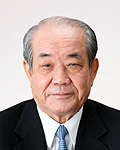Messages from Keidanren Executives and Contributed articles to Keidanren Journals December, 2014 Creating a society where all can work with vigor and enthusiasm

We, as a society, have been stressing the importance of diversity-promoting management that utilizes diverse human resources for quite some time now. That said, since the Abe administration made it a goal to expand women's participation in the workforce as one of the pillars in its growth strategy, the efforts to promote diversity seem to have picked up speed. Promotion of female participation in the workforce is a vital component in diversity-promoting management. However, in the face of a declining birthrate, women are one of the largest underused resources in Japan. Therefore, promoting female workforce participation is critical for Japan to sustain its economic growth. The government has set out to increase the percentage of women in managerial positions to 30% by 2020. I strongly believe that coming out of its traditional male-dominated management style and promoting female workforce participation will help further enhance Japan's competitive edge.
Such diversity-promoting management requires strong determination on the part of management teams to transform the way we work. Although we human beings are often reluctant to change the way we do things, we need to understand that whether we can keep up with this trend and take this as a golden chance for transformation or not, is critical for the survival of our private corporations and our country. There is no doubt that working with people who have different experiences and values will revitalize our company, including women, elders, people with disabilities, and internationals. Management must strive with determination to develop such an environment in order to create a society where everyone can work with vigor and enthusiasm.
Accepting differences is not our only duty; it is also important to leverage those differences. "Inclusion" means to accept differences, but it is not enough. We now need to promote both "diversity & inclusion" by integrating those differences, which eventually become catalysts for innovation. Where there is no "diversity & inclusion," there is no innovation.
At Japanese companies, people used to work based on the traditional Japanese concept of "aun no kokyuu," which means the ability to think and behave in unison with others (so that one can anticipate what others do or say and thus agree with them). This aun no kokyuu, however, no longer works when diversified employees start bringing different values to work. We need to be flexible enough to be able to respond to these differences, allowing for a completely new world to open up to us once we overcome the challenge. There is no doubt in my heart that it is our responsibility to future generations to create a society where each and every person can work vibrantly, so that the enhancement of Japan's competitive edge and sustainable growth of Japan's economy becomes a reality.

